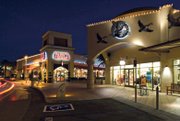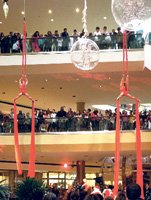Post Holiday '08, Retailers Vow to Change Game in '09
The 2008 Christmas season may change the way the fashion industry does business, according to retailers and industry analysts who say finding new ways to make and stretch a dollar will be crucial in the upcoming months. The fashion industry is reeling from what was described as the weakest holiday sales season since 1970, according to market research released Dec. 30 by the New York–based International Council of Shopping Centers, a trade association for malls.
There was no post-Christmas sales increase during the last week of 2008, according to the ICSC. Rather, American retail sales dipped 1.8 percent for the week ending Dec. 27 compared with the same week from the prior year. Sales fell 1.5 percent for the week ending Dec. 27 compared with the week ending Dec. 20.
Holiday 2008’s weak conclusion was preceded by a poor performance at the beginning of the season. November’s retail sales declined 2.7 percent compared with the same month in the previous year. Apparel retail was particularly hard hit. During November, specialty retail declined 10.4 percent. Department stores saw a decline of 13.3 percent, according to the ICSC.
The weak industry-wide performance had many retailers throwing out their playbooks and writing new rules. High-profile retailer Fraser Ross has focused on contemporary women’s fashions since he opened his boutique Kitson on Los Angeles’ exclusive Robertson Boulevard in 2000.
Yet consumer traffic dropped 40 percent in his four Robertson Boulevard boutiques in December, and Ross said he would remerchandise his stores with 25 percent less contemporary women’s fashions. While contemporary fashion will continue to play a central, crucial role at his stores, for the near future, he will focus more on item-driven merchandise such as makeup, jewelry and accessories. And basic clothing will continue to be important. “Fashion is not dead,” Ross said. “It’s just taking a turn now.”
Retailers should be prepared for retail traffic dropping in 2009, said Fred Levine, co-owner of the more than 10 M.Fredric boutiques with headquarters in Agoura Hills, Calif. “[Retailers] have no control over consumer confidence,” Levine said. “We do have control over our profit margin.”
Levine said he had been renegotiating pricing with his boutique chain’s vendors and stretching dollars. He said he hopes to pay $60 for items that wholesaled for $80 before the weak economy. M.Fredric’s ordering strategy also has changed since summer 2008. These days, Levine keeps inventory light and only reorders popular items. He noted many of his vendors have accepted his terms. “We have to get very creative as multi-line retailers,” Levine said. “We have to come up with a game plan or we won’t get to meet our payrolls.”Work smart
Manufacturers will have to become more entrepreneurial and focused on cost cutting in the upcoming year. Because 2009 may bring news of more retail closings, manufacturers might have to open their own branded boutiques to ensure their products will hit retail shelves, said Jack Kyser, chief economist of the Los Angeles County Economic Development Corp.
All companies will have to focus on cutting costs and staff where they can, said Ken Wengrod, president of Los Angeles–based financial institution FTC Commercial Corp. Wengrod also serves as chairman of the board of Los Angeles–based Fashion Business Inc., a nonprofit that offers educational, consulting and networking services to fashion businesses.
“There’s going to be a rise in chief financial officers,” Wengrod said. “There’s going to be a back-to-basics focus from boardrooms down.”
While consumers will still demand novel, fresh merchandise during economically weak times, Wengrod said he believes the companies that will thrive during the recession will be those who keep a low overhead and can manufacture and sell product quickly. Shifting strategies
A continuing weak economy will force other segments of the retail market to change. Department stores set the tone of the 2008 holiday season when they started offering incredible markdowns from 40 percent to 70 percent off during November. George Whalin, president of Carlsbad, Calif.–based Retail Management Consultants, said he worries that department stores will not be able to get their consumers to pay full price for merchandise for a while. At the same time, many of these stores will not be able to afford business as usual.
“They’re not going to be able to run constant promotions,” Whalin said. For the upcoming year, Whalin expected department-store companies to trim staff and close low-performing stores.
For e-commerce boutique owner Mary Helen Shashy, every decision a business owner makes in a weak economy is crucial. That is why she plans to watch what moves other retailers make and see what brings success. Upcoming store closings should bring surviving retailers new customers, she said.
The weak economy has made Shashy more entrepreneurial. On Dec. 29, she debuted her streetwear line for her Glendale, Calif.–based online boutique, Hotter Than Hollywood (www.hotterthanhollywood.com). She said she hopes the streetwear line Hotter Than Hollywood: The Collection will add a revenue stream to her 4-year-old business.Traffic patterns
Despite news of poor sales at the end of December, mall managers around Los Angeles and Orange counties claimed high consumer traffic for the days following Christmas.
Costa Mesa, Calif.’s South Coast Plaza said consumer traffic increased 9 percent on Dec. 26 compared with the same day the previous year. Los Angeles’ Citadel Outlets reported double-digit increases in consumer traffic in the days following Christmas. Crowds were attracted by the heavy discounts at the outlet stores, according to Citadel Marketing Director Jess Irwin. The average discount was 50 percent off the already 30 percent outlet markdown.
Consumer traffic at the Irvine Spectrum Center in Irvine, Calif., was up 13 percent the week of Christmas, according to a spokesperson from the retail center. At the Beverly Center in Los Angeles, retail traffic increased in the single digits in the days following Christmas, said General Manager Jeff Brown.
“It’s no secret. The last few weeks of 2008 were all about getting as many people into the mall,” Brown said. “The question is how that will finally pencil out.” n























